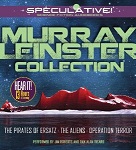
 The Mad Scientist’s Guide to World Domination
The Mad Scientist’s Guide to World Domination
Edited by John Joseph Adams
Performed by Stefan Rudnicki, Mary Robinette Kowal, and Justine Eyre
Publisher: Brilliance Audio
16 hours [UNABRIDGED]
Themes: / mad scientists / science / superheroes / villains /
Publisher summary:
Mad scientists have never had it so tough. In super-hero comics, graphic novels, films, TV series, video games, and even works of what may be fiction, they are besieged by those who stand against them, devoid of sympathy for their irrational, megalomaniacal impulses to rule, destroy, or otherwise dominate the world as we know it. Dr. Frankenstein was the first truly mad scientist of the modern era. And what did it get him? Destroyed by his own creation. And Jules Verne’s Captain Nemo, a man ahead of his time as well as out of his head — what did he do to deserve persecution? Even Lex Luthor, by all accounts a genius, has been hindered not once, not twice, but so many times that it has taken hundreds of comic books, a few films, and no fewer than ten full seasons of a television series to keep him properly thwarted. It’s just not fair. So those of us who are so twisted and sick that we love mad scientists have created this guide. Some of the names have been changed to protect the guilty, but you’ll recognize them. It doesn’t matter, though. This guide is not for you. It’s for them: the underhanded, over-brained paranoiacs who so desperately need our help. What lies behind those unfocused, restless eyes and drooling, wicked grins? Why — and how — do they concoct their nefarious plots? Why are they so set on taking over the world? If you’ve ever asked yourself any of these questions, you’re in luck, because we are exposing their secrets, aiding and abetting their evil. It all awaits, within. Watch out, world!
I really enjoyed the first half of the stories in the collection but thought things got less interesting/slower in the second half. It may have been that some stories shared some similarities and the repetition got tiresome, but I don’t think so. I think it was actually that the second half of the stories had more of a serious tone to them that just didn’t go as well with me as the more humorous first half.
I really liked Chris Claremont’s introduction to the book. I thought it brought some interesting insights into why the bad guy is so important for the hero. I thought John Joseph Adams’ introductions to each story were helpful although a bit confusing in the audiobook format (it took a few stories before I understood what the heck was going on with the scientific categorization). I thought they helped me get into the story faster since I kind of knew what to expect and I do think I enjoyed the short stories more as a result. Some would say they spoil the stories but I didn’t think they revealed any more than the back of a novel would about its story.
There are 22 stories in this collection. Many are humorous and have interesting spins on the common tropes you’d expect from mad scientist or superhero stories. I generally liked all the stories but I’d say my favorites were Professor Incognito Apologizes, The Angel of Death Has a Business Plan, Captain Justice Saves the Day, and Rocks Fall.
I didn’t overly dislike any stories except for The Space Between by Diana Gabaldon. The story is by far the longest and I had trouble following the different character’s stories and understanding the point of the story. It appears that story is from a series by her so it may be that I didn’t like it because I haven’t read her other works.
I thought all three readers did a fantastic job with their voice acting in this collection. I would definitely listen to books performed by these readers again. I particularly liked Mary Robinette Kowal’s performances. She does a great job doing voices of people trying to be patient with the mad scientists – whether it be their therapist, assistant, or fellow evil genius.
Various sites have posted some of the stories online to read for free, compiled on the editor’s site, and those would be a good litmus test if this is the book for you. Professor Incognito Apologizes: an Itemized List by Austin Grossman is a great example of the more humorous offerings and The Mad Scientist’s Daughter by Theodora Goss is a good example of the more serious stories.
Posted by Tom Schreck



 The Sphinx (Area 51 #4)
The Sphinx (Area 51 #4) Vulcan’s Hammer
Vulcan’s Hammer